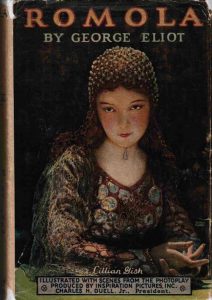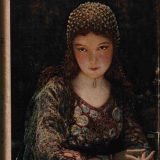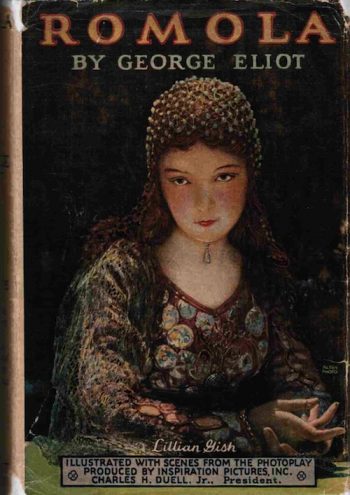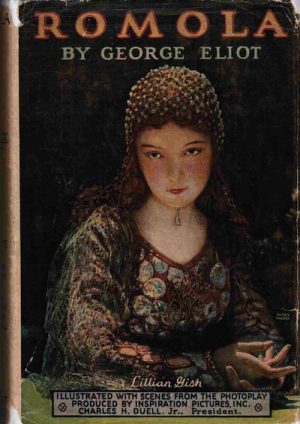Romola – George Eliot – 1863
Reviewed by: Lale
 Romola was going to be one of the best books I have read. I love historic fiction and I had enjoyed George Eliot’s other books. I knew that Eliot had spent years in preparation for Romola and I knew that she thought it was her best work. I trusted Eliot’s opinion of her own book and I believed that good books required good research. So, nothing could go wrong, I was going to love this book no matter what. I bought it but did not read it right away. Since we had an up coming Florence trip, I waited until I saw the city of Romola. As soon as we returned back from Florence, much enamoured by it, I started the book with great enthusiasm. As I read about the River Arno, Ponte Vecchio, the Campanile and the Duomo, Palazzo Vecchio and Piazza della Signoria, I recognized all the props and felt excited. The book starts with a scene in front of Dante’s house in Via Dante Alighieri, the very spot I had had my picture taken just 5 days before. However, the fun did not last long. It turned out to be one of the books I had great difficulty in finishing. I did time-sharing with two other books and by the time I was done with Romola, a month had passed. It is hard to read because of the excruciating amount of detail and obscure references for which you have to flip to the end of the book to read the editor’s notes. In my spare time, I read Encyclopedia Britannica and history books which are much easier to read than Romola.
Romola was going to be one of the best books I have read. I love historic fiction and I had enjoyed George Eliot’s other books. I knew that Eliot had spent years in preparation for Romola and I knew that she thought it was her best work. I trusted Eliot’s opinion of her own book and I believed that good books required good research. So, nothing could go wrong, I was going to love this book no matter what. I bought it but did not read it right away. Since we had an up coming Florence trip, I waited until I saw the city of Romola. As soon as we returned back from Florence, much enamoured by it, I started the book with great enthusiasm. As I read about the River Arno, Ponte Vecchio, the Campanile and the Duomo, Palazzo Vecchio and Piazza della Signoria, I recognized all the props and felt excited. The book starts with a scene in front of Dante’s house in Via Dante Alighieri, the very spot I had had my picture taken just 5 days before. However, the fun did not last long. It turned out to be one of the books I had great difficulty in finishing. I did time-sharing with two other books and by the time I was done with Romola, a month had passed. It is hard to read because of the excruciating amount of detail and obscure references for which you have to flip to the end of the book to read the editor’s notes. In my spare time, I read Encyclopedia Britannica and history books which are much easier to read than Romola.
The story was interesting enough, taking place in the time of Savonarola, Florence’s religious leader, recounting the intrigues of Tito, a charming scholar with questionable morals. Tito marries Romola and starts his crusade towards prestige, power and wealth, prepared to crush anyone who poses an obstacle, including Romola. Machiavelli plays himself and Dante is cited frequently. Most Italian philosophers, painters, sculptures, architects are mentioned. The amount of name-dropping is head-spinning.
Just an example of a reference-infested paragraph:
It is well said, Romola. It is a Promethean word* thou hast uttered,” answered Bardo, after a little interval in which he had to lean on his stick again, and to walk on. “and I indeed am not to be pierced by the shafts of Fortune. My armour is the aes triplex* of a clear conscience, and a mind nourished by the precepts of philosophy.’For men’ says Epictetus,* `are disturbed not by things themselves, but by their opinions or thoughts concerning those things.’ And again, `whosoever will be free, let him not desire or dread that which it is in the power of others either to deny or inflict: otherwise, he is a slave.’ And of all such gifts as are dependent on the caprice of fortune or of men, I have long ago learned to say, with Horace-who however, is too wavering in his philosophy, vacillating between the precepts of Zeno and the less worthy maxims of Epicurus, and attempting, as we say, `duabus sellis sedere’*-concerning such accidents, I say, with the pregnant brevity of the poet-‘Sunt qui non habeant, est qui non curat habere.’* He is referring to gems …
And it goes on. Bardo, the scholar, is talking to his daughter Romola. Just like my dad used to talk to me. For the words or phrases marked with * you have to read the explanatory notes at the back of the book. For the rest, you are on your own. Good luck!
















